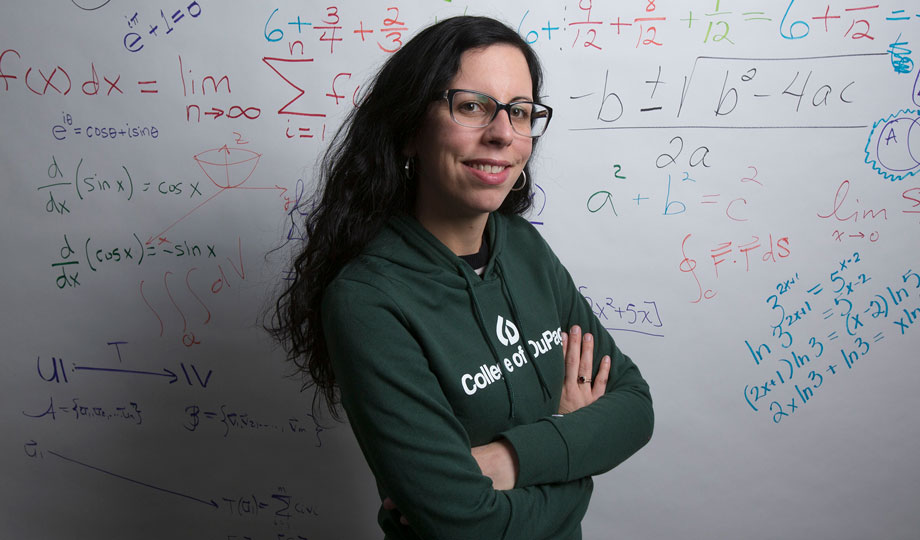
Program: Mathematics
When Jennifer Hill was young, she struggled with mathematics.
“I was a very creative, artsy kid, and I liked figuring out how things worked. For whatever reason, math just never really made sense to me,” she said. “Then in junior high, I started figuring out how to make websites writing HTML code. In developing a mindset for how to troubleshoot with programming, I also developed a mindset for how to approach math. After that, everything just ‘clicked’ and I loved how all of these ideas fit together so beautifully.”
After high school, Hill started at a community college, not entirely sure of a career but knowing it would involve math. She initially was going to major in economics but during her second semester, she started to tutor math in the student success center.
“I always felt like I could understand other students’ struggles and frustration because I had experienced that as a kid, and I loved finding ways to help make sense of the material,” she said. “Teaching math at a community college just felt like my calling and after that semester, I decided to double major in math and economics.”
Hill earned an associate degree from Rock Valley College, a bachelor’s from the University of Illinois at Urbana-Champaign, and a master’s in Mathematics from Indiana University. Knowing how competitive it was to find a full-time position at a community college, she leveraged her math and economics background and worked for five years as a financial analyst in the home office of a major insurance company while teaching part-time at the College of Lake County.
“I always felt like my experience in the industry made me a better teacher, and I often try to incorporate how math can prepare you for the real world in surprising ways when I teach.”
Now at College of DuPage, Hill knows the classroom is where she belongs. She also is pursuing her doctorate and studying online learning, which she finds fun and useful during the pandemic.
“Every year, I try to think of new ways to innovate or enhance the experience in the classroom. Some ideas succeed, others fail, but I feel like I just become a better teacher from each experience I have,” she said. “I want my students to feel empowered to make the right decisions about their learning, their major, their careers and their futures. I want them to understand how they approach technical problems and feel empowered to sort through them, even if they are difficult.
“Math is a metaphor for problems in life, and it can teach you quite a bit about yourself if you frame it the right way. Mistakes are natural in mathematics, and students don’t realize how vital they are for the learning and growth process.”
Because of this, Hill is inspired by how great people persevere through failure and continue to fulfill incredible possibilities.
“All of the greatest icons who we look up to have stories of enormous failures—Elon Musk, Michael Jordan, Albert Einstein, Ruth Bader Ginsburg, and the list goes on and on. Think of anyone who you look up to that ‘made it,’ and you will also learn about the ongoing list of failures that pushed them to be better. In math, you will make mistakes regularly, and if you can accept your struggles and your mistakes, and then figure out how to keep pushing, you will be unstoppable in anything else you want to do.”